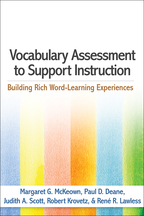Vocabulary Assessment to Support Instruction
Building Rich Word-Learning Experiences
Margaret G. McKeown, Paul D. Deane, Judith A. Scott, Robert Krovetz, and René R. Lawless
HardcoverPaperbacke-bookprint + e-book
Hardcover
orderJuly 18, 2017
ISBN 9781462530809
Price: $54.00 254 Pages
Size: 6" x 9"
Paperback
orderJuly 19, 2017
ISBN 9781462530793
Price: $36.00 254 Pages
Size: 6" x 9"
Margaret G. McKeown, PhD, is Clinical Professor of Education in the School of Education and a Senior Scientist at the Learning Research and Development Center at the University of Pittsburgh. Her work addresses practical, current problems that classroom teachers and their students face. Dr. McKeown has conducted research in the areas of instructional design and teacher professional development in reading comprehension and vocabulary. She is a recipient of the Outstanding Dissertation of the Year Award from the International Literacy Association and a National Academy of Education Spencer Fellowship. Prior to her career in research, Dr. McKeown taught reading and language arts in elementary school. She is coauthor of books including Bringing Words to Life, Second Edition, and Creating Robust Vocabulary.
Paul D. Deane, PhD, is a Principal Research Scientist in Research and Development at Educational Testing Service (ETS). He has published extensively on lexical semantics, vocabulary assessment, writing assessment, and principles of assessment design. His research on vocabulary assessment has focused on developing methods to measure different aspects of vocabulary depth and breadth. During his career at ETS, Dr. Deane has also played a key role in the Cognitively Based Assessments of, for, and as Learning (CBAL) research initiative, where he led the development of learning progressions and assessment designs for English language arts, including vocabulary assessment.
Judith A. Scott, PhD, is Associate Professor in the Department of Education at the University of California, Santa Cruz. Her work addresses vocabulary acquisition and blending vocabulary instruction with effective teacher education within the context of language, literacy, and culture. Dr. Scott has been the lead researcher on three federally funded vocabulary research projects, including one focused on innovation in vocabulary assessment. She is a recipient of the John C. Manning Public School Service Award from the International Literacy Association. She also serves as a consultant for technology companies, helping them with educational applications and assessment.
Robert Krovetz, PhD, an independent researcher and consultant based in New Jersey, has consulted for Educational Testing Service on projects to improve the assessment of vocabulary breadth and depth. He has published more than 30 papers, including one on morphology and information retrieval that has been cited by more than 700 other papers and was ranked by Citeseer as one of the 100 most-cited papers of the year in computer science. Dr. Krovetz has given invited talks at the American Society for Information Science and the Association for the Advancement of Artificial Intelligence symposium on Text-Based Intelligent Systems. Previously he was a scientist at the NEC Research Institute and a senior research scientist at Ask Jeeves.
René R. Lawless, EdM, is a Principal Research Associate in Research and Development at Educational Testing Service. Her research has focused on the creation of measures of students’ breadth and depth of vocabulary knowledge, second-language acquisition of vocabulary, evidence-centered design, and fairness across assessments. Ms. Lawless is currently working on fairness projects for cultural and linguistic minorities, for which she has coauthored multiple white papers, and is lead author of fairness guidelines for the International Test Commission.
Paul D. Deane, PhD, is a Principal Research Scientist in Research and Development at Educational Testing Service (ETS). He has published extensively on lexical semantics, vocabulary assessment, writing assessment, and principles of assessment design. His research on vocabulary assessment has focused on developing methods to measure different aspects of vocabulary depth and breadth. During his career at ETS, Dr. Deane has also played a key role in the Cognitively Based Assessments of, for, and as Learning (CBAL) research initiative, where he led the development of learning progressions and assessment designs for English language arts, including vocabulary assessment.
Judith A. Scott, PhD, is Associate Professor in the Department of Education at the University of California, Santa Cruz. Her work addresses vocabulary acquisition and blending vocabulary instruction with effective teacher education within the context of language, literacy, and culture. Dr. Scott has been the lead researcher on three federally funded vocabulary research projects, including one focused on innovation in vocabulary assessment. She is a recipient of the John C. Manning Public School Service Award from the International Literacy Association. She also serves as a consultant for technology companies, helping them with educational applications and assessment.
Robert Krovetz, PhD, an independent researcher and consultant based in New Jersey, has consulted for Educational Testing Service on projects to improve the assessment of vocabulary breadth and depth. He has published more than 30 papers, including one on morphology and information retrieval that has been cited by more than 700 other papers and was ranked by Citeseer as one of the 100 most-cited papers of the year in computer science. Dr. Krovetz has given invited talks at the American Society for Information Science and the Association for the Advancement of Artificial Intelligence symposium on Text-Based Intelligent Systems. Previously he was a scientist at the NEC Research Institute and a senior research scientist at Ask Jeeves.
René R. Lawless, EdM, is a Principal Research Associate in Research and Development at Educational Testing Service. Her research has focused on the creation of measures of students’ breadth and depth of vocabulary knowledge, second-language acquisition of vocabulary, evidence-centered design, and fairness across assessments. Ms. Lawless is currently working on fairness projects for cultural and linguistic minorities, for which she has coauthored multiple white papers, and is lead author of fairness guidelines for the International Test Commission.



